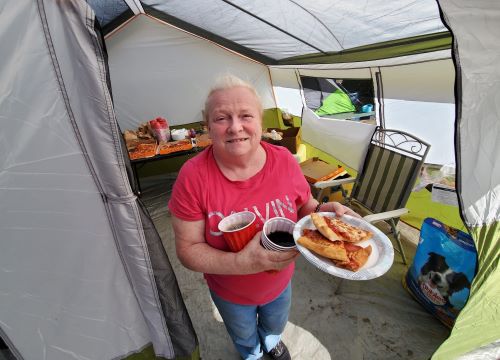Biddeford will tackle homeless encampments
 |
|
Several unhoused people live in tents at a homeless encampment on Water Street in Biddeford. PHOTO BY RANDY SEAVER
|
The city of Biddeford is expected to soon make several policy changes that will impact homeless encampments throughout the city, including a well-known encampment located near Mechanics Park on the banks of the Saco River.
During an interview Thursday, Mayor Marty Grohman said that he and several other community partners are trying to finalize a plan that would relocate unhoused persons from city parks and other public spaces to a more “stable” location that could provide shelter and access to community services.
Grohman says the details are still evolving, but expects to have a plan in place within the next several days. The mayor said he hopes more details can be figured out and announced at the next regular city council meeting on May 7.
“We want to do this the right way,” Grohman emphasized on Thursday afternoon. “We want to be compassionate and respectful. No one should have to live outside in Maine.”
Grohman said the city is being careful in its planning to close the homeless encampments that have sprung up throughout the city.
Many communities across the United States are now involved in lawsuits that have been filed by homeless advocates in opposition to municipalities that are trying to close or prohibit unhoused encampments.
According to an article from the Salem Reporter newspaper in Oregon, the city of Grant’s Pass, Ore., filed an appeal with the U.S. Supreme Court after lower courts ruled in favor of two homeless residents who sued the town because of an ordinance that prohibited people from camping and sleeping in parks and on public property.
“Everyone deserves to the opportunity to be inside,” Grohman said. “We want to move forward with respect. We’re trying to look at all the angles, including the possibility of providing storage space for personal belongings.”
Grohman said the city is now developing a plan with three key elements: determining a date for implementation of the new policy; a specific location for an organized shelter; and the possibility of working with other communities and public agencies to include the York County Shelter.
“There are a lot of moving parts,” Grohman said. “We have to consider the big picture, including concerns expressed by several of our downtown business owners, people who like to shop and visit the city, and those who are on the front lines in doing whatever they can to assist our less fortunate neighbors.
“We are striving for a collaborative process,” the mayor added.
Vassie Fowler, executive director of the Seeds of Hope Neighborhood Resource Center on South Street, said she had not been told about the plan or potential policy changes.
“Helping the unhoused is literally my job,” Fowler said. “All I can really say at this time, is that I will be watching carefully to see how this plays out. I have concerns, but I guess we just need to wait and see some specifics about all of this.”
Biddeford Police Chief Joanne Fisk said the police department has an established set of guidelines regarding how officers interact with unhoused individuals.
Those guidelines (Homeless Crisis Protocol) were established a little more than a year ago on April 5, 2023.
Fisk said she is optimistic that the city can find a “practical, respectful and coordinated” solution for a problem that only seems to be growing.
According to Fisk, a public meeting is scheduled for May 9 at the McArthur Library on Main Street. Fisk said one of the people who will be presenting information at that meeting is York County District Attorney Kathryn Slattery.
The district attorney, Fisk said, will be available to answer questions and concerns and will outline state guidelines and procedures regarding unhoused persons.
According to Delilah Poupore, executive director of the Heart of Biddeford, which is a downtown business and cultural booster organization, said “several downtown business owners” gathered earlier this week to discuss issues impacting the Washington Street neighborhood.
During that meeting, Poupore said, several business owners also expressed their growing frustrations about how some unhoused persons are adversely impacting their businesses.
“It’s certainly something we are all aware of, and I truly believe that everyone at that meeting were all on the same page,” Poupore said. “It may be difficult, but we have to find a balanced approach. Everyone I have talked to wants to tackle this issue with compassion and empathy, but we must also be cognizant of some negative impacts that are taking place in the downtown area.”
Douglas Darby and Ciel Caldwell, the owners of the Dunn Bar restaurant on Washington Street said they have had ongoing problems with unhoused persons in the neighborhood.
Caldwell said she is happy that the city is stepping up its response to the issue. “We’re all human beings,” she said. “We want to be empathetic to people facing challenges, but we also have to run our business.”
Darby and Caldwell said they are not alone, pointing out that several other nearby businesses have also raised issues with the city, all pointing to an increasing problem.
“Right here – on Washington Street – we’re right in the middle of the unhoused migration traffic between the former courthouse on Adams Street and the encampments,” Caldwell said. “We’re dealing with public urination on our property, flagrant drug use and aggressive behavior, including heckling of our customers.”
Meanwhile, at the unhoused encampment on Water Street, several unhoused residents said they had not yet heard about potential changes to city regulations.
A 28-year-old woman who refers to herself as Blu told Saco Bay News that she is 18 weeks pregnant and trying to survive on her Social Security Disability income. “It’s really hard,” she said. Blu said she is originally from Scarborough and has been living at the encampment since December of last year. “I’m glad that they’re finally going to do something to help us,” she said.
 |
Melinda, who lives at the tent encampment on Water Street in Biddeford, grabs lunch at a community tent provided by volunteers. PHOTO BY RANDY SEAVER |
A woman named Melinda said she and her husband have been living in a tent since October. “My rent went way up, and I couldn’t afford it,” she said. “So, here I am. Before staying here, we were just on the streets.
“My husband has epilepsy and we have a service dog,” she said. “At least here, people are nice. People bring us three meals a day and help us keep this place clean. I do hope things get better for us. Living outside is hard.”
Randy Seaver is a cranky, nearly insufferable malcontent living in Biddeford. He is a retired newspaper editor and the principal of a small strategic communications consulting firm. Randy Seaver can be contacted at [email protected].

